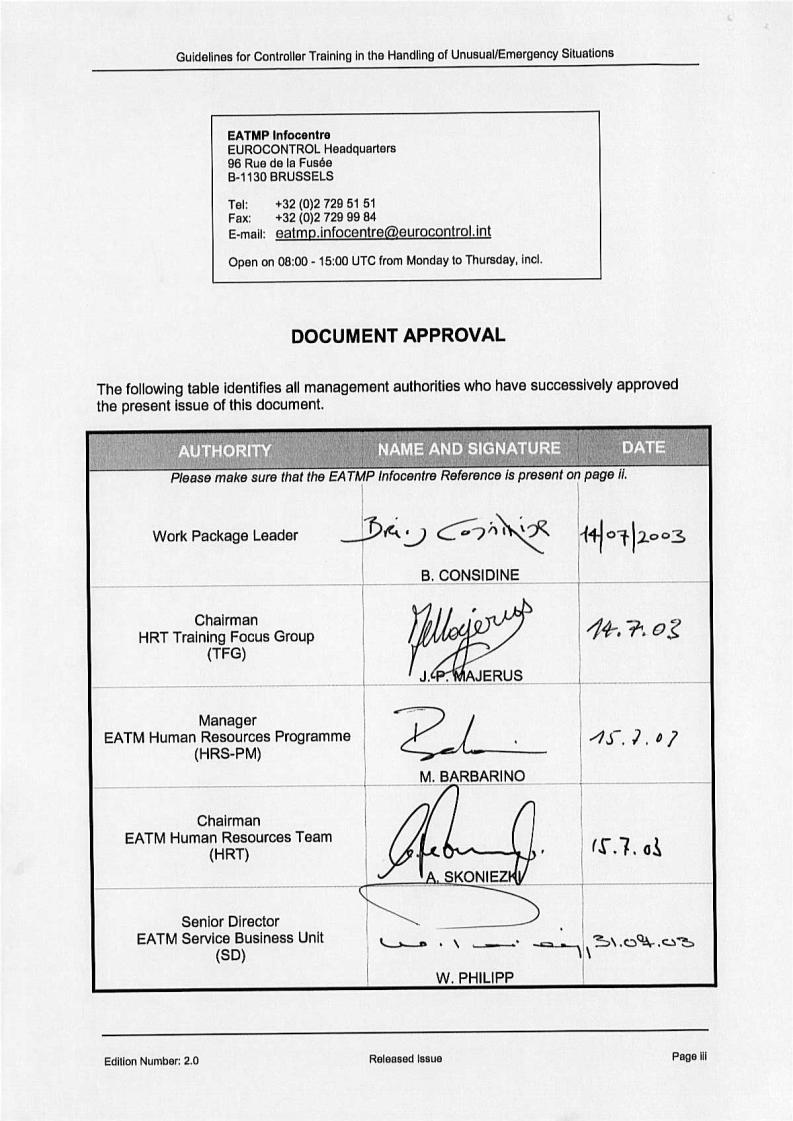
Checklists booklet
.pdf
EUROPEAN ORGANISATION
FOR THE SAFETY OF AIR NAVIGATION
EUROCONTROL
This Document is issued as an EATMP Guideline. The contents are not mandatory. They provide information and explanation or may indicate best practice.
Guidelines for Controller Training in the Handling of Unusual/Emergency Situations
Edition Number |
: |
2.0 |
Edition Date |
: |
31.07.2003 |
Status |
: |
Released Issue |
Intended for |
: |
EATMP Stakeholders |
EUROPEAN AIR TRAFFIC MANAGEMENT PROGRAMME

Guidelines for Controller Training in the Handling of Unusual/Emergency Situations
DOCUMENT CHARACTERISTICS
TITLE
Guidelines for Controller Training in the Handling of Unusual/Emergency Situations
|
EATMP Infocentre Reference: |
030617-04 |
Document Identifier |
Edition Number: |
2.0 |
HRS/TSP-004-GUI-05 |
Edition Date: |
31.07.2003 |
|
Abstract |
|
Many present day controllers rarely experience an unusual/emergency situation. Short training periods of half a day are of benefit, and the use of case studies is suggested. Checklists can help to ensure a proper response. Regular pilot-controller briefings are very desirable.
|
Keywords |
Checklist |
PANPAN |
MAYDAY |
Refresher Training |
Secondary Surveillance Radar (SSR) Codes |
ASSIST |
Unusual/Emergency Training |
|
|
|
Contact Person |
Tel |
|
Unit |
Brian CONSIDINE |
+352 436061501 |
Training Development and Harmonisation (TDH) Unit |
|
STATUS, AUDIENCE AND ACCESSIBILITY
Status |
|
|
Intended for |
|
|
Accessible via |
|
Working Draft |
o |
|
General Public |
o |
|
Intranet |
o |
Draft |
o |
|
EATMP Stakeholders |
þ |
|
Extranet |
o |
Proposed Issue |
o |
|
Restricted Audience |
o |
|
Internet (www.eurocontrol.int) |
þ |
Released Issue |
|
|
|
|
|
|
|
þ |
|
Printed & electronic copies of the document can be obtained from |
|
||||
|
|
|
the EATMP Infocentre (see page iii) |
|
|||
ELECTRONIC SOURCE
Path: |
G:\Deliverables\HUM Deliverable pdf Library\ |
|
|
Host System |
Software |
Size |
|
Windows_NT |
Microsoft Word 8.0b |
|
|
Page ii |
Released Issue |
Edition Number: 2.0 |


Guidelines for Controller Training in the Handling of Unusual/Emergency Situations
DOCUMENT CHANGE RECORD
The following table records the complete history of the successive editions of the present document.
EDITION |
EDITION DATE |
INFOCENTRE |
REASON FOR CHANGE |
PAGES |
|
NUMBER |
REFERENCE |
AFFECTED |
|||
|
|
||||
|
|
|
|
|
0.1 |
17.06.1998 |
|
|
Draft |
||
|
|
|
|
|
|
|
0.2 |
28.09.1998 |
|
|
Proposed Issue |
||
|
|
|
|
|
|
|
1.0 |
29.06.1999 |
|
|
Released Issue |
||
|
|
|
|
|
|
|
1.1 |
12.11.2002 |
|
|
Working Draft |
||
|
|
|
|
|
|
|
1.2 |
14.02.2003 |
|
|
Proposed Issue for HRT19 |
||
|
|
(basic document configuration) |
||||
|
|
|
|
|
||
|
|
|
|
|
|
|
|
|
|
|
|
Released Issue, agreed at HRT19 on |
|
2.0 |
31.07.2003 |
030617-04 |
26.03.2003 |
|||
(advanced document configuration and |
||||||
|
|
|
|
|
||
final editorial changes)
All
All
All
All
All
All
Page iv |
Released Issue |
Edition Number: 2.0 |

Guidelines for Controller Training in the Handling of Unusual/Emergency Situations
CONTENTS
DOCUMENT CHARACTERISTICS............................................................................ |
ii |
||
DOCUMENT APPROVAL ......................................................................................... |
iii |
||
DOCUMENT CHANGE RECORD ............................................................................. |
iv |
||
EXECUTIVE SUMMARY ............................................................................................ |
1 |
||
1. |
INTRODUCTION .................................................................................................. |
3 |
|
|
1.1 |
Background .............................................................................................................................. |
3 |
|
1.2 |
Scope and Purpose.................................................................................................................. |
3 |
2. |
ORGANISATION OF THE TRAINING ................................................................. |
5 |
|
3. |
ACRONYMS AND MNEMONICS......................................................................... |
7 |
|
|
3.1 |
RISC ......................................................................................................................................... |
7 |
|
3.2 |
TAS........................................................................................................................................... |
7 |
|
3.3 |
SSSS ........................................................................................................................................ |
7 |
|
3.4 |
QRST........................................................................................................................................ |
7 |
|
3.5 |
ATIS.......................................................................................................................................... |
8 |
|
3.6 |
ASSA ........................................................................................................................................ |
8 |
|
3.7 |
ASSIST..................................................................................................................................... |
8 |
4. |
CHECKLISTS....................................................................................................... |
9 |
|
5. |
TRAINING - GENERAL ..................................................................................... |
11 |
|
6. |
TRAINING PROGRAMME FOR CONTROLLERS ............................................ |
13 |
|
ANNEX A. POSTER................................................................................................ |
17 |
||
ANNEX B. CHECKLIST BOOKLET........................................................................ |
19 |
||
REFERENCES ......................................................................................................... |
37 |
||
ABBREVIATIONS AND ACRONYMS...................................................................... |
39 |
||
CONTRIBUTORS..................................................................................................... |
43 |
||
Edition Number: 2.0 |
Released Issue |
Page v |

Guidelines for Controller Training in the Handling of Unusual/Emergency Situations
Page intentionally left blank
Page vi |
Released Issue |
Edition Number: 2.0 |

Guidelines for Controller Training in the Handling of Unusual/Emergency Situations
EXECUTIVE SUMMARY
This deliverable and its associated annexes are produced as a result of a workshop on the handling of unusual incidents held at the EUROCONTROL Institute of Air Navigation Services (IANS), Luxembourg, in April 1996.
The presentations at the workshop were in many cases based on real incidents and it was possible to identify the individuals concerned. As this is a sensitive area, the actual workshop has not been reported on in a formal manner, but this document uses the presentations and their content to convey the need for continuation training for air traffic controllers in the area. Some examples of the type of incidents are used.
A ‘checklist’ is proposed for use in order to ensure proper handling of any incident which requires controller action. Suggestions for the content of such a checklist are included. The background material has been provided by Germany, Switzerland, The United Kingdom and The Netherlands. Additional input and advice was provided by aircrew personnel from Deutsche Lufthansa (DLH).
A simple set of acronyms has been provided which may make it easier for controllers to remember the immediate actions, or sequence of actions, to be followed on initial notification of any incident.
The guidelines include some comment on the fact that pilots in general are reluctant to use the phrases ‘PAN PAN’ or ‘MAYDAY’. A major exercise in conveying the real benefits of the use of the Secondary Surveillance Radar (SSR) special codes to pilots should be embarked on as quickly as possible, using magazine articles, seminars and joint pilot-controller discussion groups.
This second edition of the deliverable is intended to reflect any operational changes that have come about since the first edition in 1999 and includes a new checklist on Airborne Collision Avoidance System (ACAS) / Traffic Alert and Collision-Avoidance System (TCAS) procedures.
Edition Number: 2.0 |
Released Issue |
Page 1 |

Guidelines for Controller Training in the Handling of Unusual/Emergency Situations
Page intentionally left blank
Page 2 |
Released Issue |
Edition Number: 2.0 |

Guidelines for Controller Training in the Handling of Unusual/Emergency Situations
1.INTRODUCTION
1.1Background
Many controllers in these days of improved equipment, both in the air and on the ground, go through lengthy periods without ever having to handle any traffic situation which presents anything out of the ordinary.
While this trend of increased safety for the flying public is most welcome, it does point out the need for the controller to be kept in practice in dealing with any situation which may arise so that when something unusual occurs safety is not impaired.
Within the European Air Traffic Management Programme (EATMP)1 framework a Work Package, which became a Specialist Task (ST12) covering continuation training for air traffic controllers, was established at a very early stage. In that context this document was prepared to provide a brief insight into what is possible, and what is desirable.
Following the publication of this deliverable in June 1999 work has continued on the development of this training. It has now evolved to a Web-based training package allowing for self-tuition.
This new print edition has been rationalised with new and updated checklists including one for Airborne Collision Avoidance System (ACAS) / Traffic Alert and Collision-Avoidance System (TCAS).
This deliverable is complementary to the Web-based training (available at http://www.ians.lu).
Note: For the purposes of the checklist on Radio Communications Failure, the procedures in ICAO Doc 7030, Regional Supplementary Procedures (European Region), have been used.
1.2Scope and Purpose
The original intention after the workshop was to produce a report which contained details of all of the presentations made. However, on examination it was felt that this might lead to publication of some data which could be regarded as very sensitive and possibly confidential.
Many points very pertinent to the future training practices in regard to the handling of such situations were made at the workshop. The workshop pointed
1 Formerly known as the ‘European Air Traffic Control Harmonisation and Integration Programme (EATCHIP).
Edition Number: 2.0 |
Released Issue |
Page 3 |

Guidelines for Controller Training in the Handling of Unusual/Emergency Situations
out areas which need to be part of an advisory service for all air traffic controllers. The need to keep colleagues and the supervisor in the loop was very noticeable, as was the need to provide an appropriate level of service to the pilot. Frequency clutter should be reduced to a minimum, the pilot should be given time and space in which to make initial attempts to solve the problems.
As each incident, however routine, is nowadays investigated and analysed, an international trend became apparent which suggests that the following actions were both desirable and necessary:
•discussion groups to analyse the incident and the controllers reaction;
•support on the counselling front for the controller who has been in position during an accident or very serious incident;
•the creation of simulation exercises which include the pertinent parts of the accident/ incident scenarios;
•the use of role playing sessions.
The Training Development and Harmonisation (TDH) Unit at IANS, through the Training Sub-Group (TSG) of the EATMP Human Resources Team (HRT), decided to create an informal working group made up of personnel from Member States having some experience in the matter. To this initial group were added, on a voluntary basis, two airline pilots from a major European air carrier.
In discussion this group reached a broad consensus on a plan of action which could be presented to the European Civil Aviation Conference (ECAC) States as a guideline on how to deal with the problem, and a suggested course format for any training.
Page 4 |
Released Issue |
Edition Number: 2.0 |
